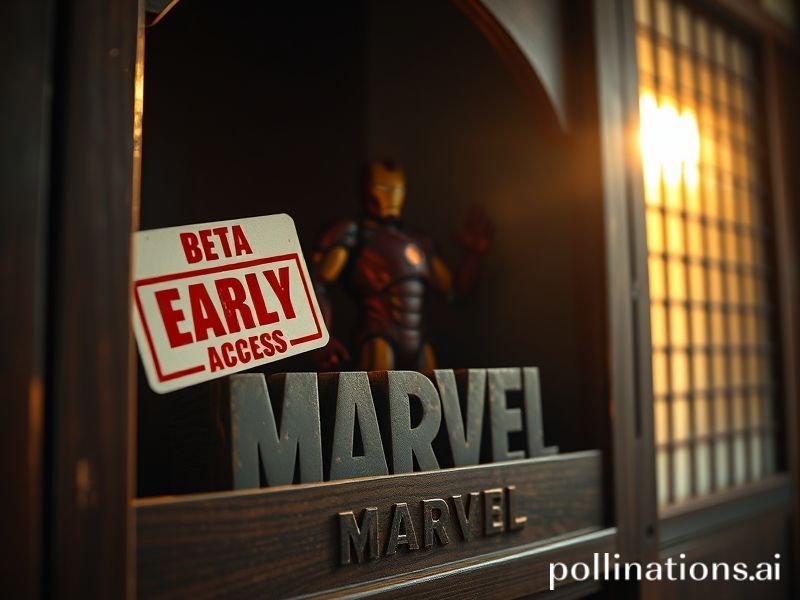Marvel Tokon Beta: The Day Disney Started Minting Money and Central Banks Called Their Therapist
Marvel Tokon Beta: When the World’s Favorite Superhero Franchise Decides to Issue Its Own Currency (and Nobody Tells the IMF)
By the time most of you woke up this morning, some kid in Lagos had already flipped a pixelated Captain America shield NFT for enough Marvel Tokon Beta (MTB) to buy three weeks of actual groceries. In Mumbai, a college sophomore was live-streaming herself staking her Iron Man tokens while her parents—oblivious—argued about the price of onions downstairs. In Frankfurt, a bemused Bundesbank analyst muttered “scheisse” into his fourth espresso, realizing that the same studio that once gave us Spider-Ham is now stress-testing the concept of stateless money faster than the ECB can say “price stability.”
Welcome to Marvel Tokon Beta, the House of Mouse’s half-kidding, half-killer experiment in turning fandom into liquidity. Part loyalty point, part crypto asset, part speculative fever dream, MTB began as a quiet closed beta on selected Disney+ accounts last quarter. Users earn tokens by binge-watching, buying merch, or—delightfully dystopian—letting their smart fridges auto-order limited-edition Avengers-branded oat milk. Spend the tokens on digital collectibles, theme-park FastPasses, or, because life imitates satire, convert them into Philippine pesos via an OTC desk in Makati that also moonlights as a BTS fan-club hub.
The global implications? Start with the 172 countries where Disney+ is now available—minus the ones that still think the internet is a phase. Each of those jurisdictions woke up to a brand-new parallel currency swirling around in teenagers’ phones, unmoored from any central bank but still backed, however tenuously, by the full faith and credit of Mickey’s legal department. El Salvador, which already treats Bitcoin like a national Pokémon card, is reportedly “monitoring” MTB for “potential synergies,” a phrase that in bureaucrat-speak translates to “we have absolutely no idea what’s happening.” Meanwhile, Chinese regulators—never ones to let a good subversion go unsuppressed—have banned Marvel IP outright, which only drove up black-market MTB prices in Shanghai gaming cafés by 400 percent. Nothing says “healthy monetary policy” like a cartoon hammer arbitraging the yuan.
Irony abounds. The same week the World Bank warned that 60 percent of low-income nations are flirting with debt default, retail investors in São Paulo were leveraging their MTB stacks to short the Turkish lira, because why not bet against a country whose president thinks high interest rates cause inflation? Over in Brussels, the European Commission convened an emergency task force to determine whether Marvel money constitutes a “systemically important meme.” They adjourned after six hours, having agreed only on the catering order.
Human nature, of course, remains reliably absurd. In South Korea, where digital idol culture has already gamified breathing, MTB “mining rigs” consist of 32 phones simultaneously streaming WandaVision on mute—an energy-efficient alternative only if you ignore the existential cost. In the United States, a Florida man tried to pay property tax with 2.7 million MTB. The county clerk refused, citing “lack of federally recognized mouse endorsement,” proving yet again that bureaucracy is the final boss.
But don’t mistake the circus for mere fandom. Disney’s pilot program quietly hired economists who once wrote white papers for the Bank for International Settlements. The tokenomics are sophisticated: supply is algorithmically capped at 14 billion—roughly double the number of times Disney has re-released the Star Wars trilogy—while staking yields decline logarithmically, ensuring latecomers get the economic equivalent of leftover shawarma. Translation: even your childhood nostalgia now comes with a deflationary twist.
The broader significance? We’ve arrived at the moment when cultural capital and actual capital finish their long, awkward Tinder date and decide to move in together. States used to monopolize money because they monopolized violence; Disney monopolizes bedtime stories. If the latter proves stickier than the former, we may soon measure sovereign credit ratings in how many princesses you can mint per capita. The IMF, bless its anachronistic heart, is still writing press releases about “sound fiscal frameworks.” Somewhere, Deadpool is live-tweeting them for MTB tips.
So keep an eye on the exchange rate. Today a Thor token buys you a churro in Anaheim. Tomorrow it might buy you—well, let’s not give the multiverse ideas.







